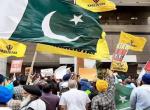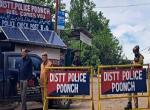The surgical strikes by the Indian army on the launch pads along the Line of Control (LoC) in J&K for infiltrating terrorists into India is a long-awaited step with major implications for the future. For 55 years India has not crossed the LoC in J&K to retaliate against Pakistan’s direct aggression and acts of war through proxies. Especially after Pakistan became nuclear and its involvement in terrorism in J&K and across India assumed grave proportions, we have desisted from cross-LoC operations for fear of escalation and concern about the nuclear environment in which we are operating.
During the 1999 Kargil conflict strict orders were given to the armed forces not to cross the LoC for dislodging the Pakistani army from the heights clandestinely occupied on our side. During Operation Prakaram in 2001 we took no punitive military action across the LoC. We have suffered massive terrorist attacks all over the country, including the horrendous Mumbai attacks in 2008 and at Pathankot and Uri this year- not to mention other attacks in Punjab and Jammu - without any military riposte by us.
Prime Minister Modi’s government has also tried until now to deal with Pakistan diplomatically, with a long rope given to Nawaz Sharif. Despite the enormity of the Pathankot attack the possibil-ity of resolving its consequences through peaceful means was explored, but without any result. Pakistan’s decision to wade into the situation in Kashmir after Burhan Wani’s killing, treating him as a martyr, declaring Pakistan’s Independence Day as Martyr’s Day in his honour, raking up the Kashmir issue internationally in order to encourage more violence on the ground in the Valley, demonstrated once again the futility of engaging Nawaz Sharif to steer Pakistan on a friendly course with India. His exceptionally negative speech at the UN General Assembly (GA) confirmed this unfortunate fact.
The Uri attack placed Shri Modi in an untenable position with regard to his conciliatory Pakistan policy. It was no longer possible to rely on Nawaz Sharif’s supposedly positive attitude towards India to break the existing deadlock in bilateral relations, or give the civilian government of Paki-stan political space vis a vis the country’s armed forces by engaging the former. Modi and his pre-decessors have not, of course, been wrong in believing that the principal challenge before India is to accelerate its economic development, remove poverty and raise the standard of living of its people, for which conflict with Pakistan should be avoided as far as possible. But Pakistan has made this sensible policy impractical.
The lesson from Uri is that Pakistan’s endemic hostility towards India nullifies all goodwill efforts on our part to engage it. Modi’s decision to do a correction course in his Pakistan policy therefore became unavoidable. The firmness with which he has done this is both surprising and admirable. He has laid out a slew of measures to inflict political, economic and military costs on Pakistan as no Prime Minister has done before. The surgical strikes against Pakistan this week have removed a huge psychological barrier that we had created for ourselves that any such action could have unpredictable consequences and escalation may become difficult to control. This has changed the rules of the game being played so far. Earlier, Pakistan had the freedom to initiate acts of terror-ism as it pleased with the conviction that India would issue tough statements, promise to punish those responsible, announce zero tolerance towards terrorism and, after an interregnum, agree to resume dialogue, arguing that there is no option but to have a dialogue, that without one prob-lems cannot be solved, and that a country can choose friends but not neighbours and so on. Modi has discarded the necessary constraints of this logic and by these surgical strikes he has given the armed forces enormous space to retaliate at a place and time of their choice. Pakistan has now to factor into its strategy to bleed India with a thousand cuts not a predictable Indian response but an unpredictable one.
India has also played its cards very well by engaging the Pakistani DGMO before the strikes were undertaken, pointing out to him that we were monitoring movement by terrorists towards the LoC and questioning him on what had detected. The Pakistani DGMO, as expected, denied any such movement, characterising it as a figment of our imagination. With the terrorists moving to the launch pads close to the LoC our special forces chose to undertake pre-emptive surgical strikes against them. To avoid escalation our DGMO informed his counterpart about the strikes and con-veyed to him that having taken out the terrorists we were planning no further action. By this we put the onus of escalation squarely on Pakistan’s shoulders.
It is sensible on our part not to reveal too many details of our operation or publicise the casualties caused on the Pakistani side. All the more so as the Pakistani side is downplaying India’s action by claiming that no surgical strikes were conducted, that only the usual cross-LoC firing by Indian forces took place to which the Pakistani forces responded. In these exchanges they have admitted that two Pakistani soldiers were killed. By taking this line Pakistan is seemingly closing the door on any retaliatory strike. Logically, if there has been no strike by India, Pakistan would have no justifi-cation to strike back, and if it did, it would be accused of willful escalation on its part. As it is, Paki-stan is increasingly in the dock internationally on the issue of terrorism, and if it retaliated in order to defend its right to launch terrorist attacks against India it would be in a still more difficult position at the international level. It was astute on our part to characterise our action as a counter-terrorism operation and not one against the Pakistani military, as the rest of the world would have difficulty in objecting to the stated purpose of the Indian action in the face of Pakistan’s unwillingness or inability to control terrorism emanating from its soil. There is now a wide international consensus that terrorism has to be fought collectively, that no distinction should be made between good and bad terrorists and that no cause justifies recourse to terrorism.
If on the military front we played our hand well, on the diplomatic front too we have handled the situation professionally. Modi had already focused on diluting the support Pakistan has traditional-ly obtained from Islamic countries by engaging Saudi Arabia, UAE, Qatar, Turkey, Bahrain, Iran, Malaysia and so on. One result of this has been the surprisingly supportive statements coming from the Gulf countries on the Uri attack, characterising it as a terrorist attack even if it was on a military target and it occurred in the background of civilian deaths in the Valley at the hands of the security forces. India also took the step of briefing key countries on the steady stream of terrorists infiltrated by Pakistan into India in batches of four in the last two months, the dates when this occurred, the number of interdictions on our part and so on. The Pakistan high commis-sioner was confronted with this information twice by the Foreign Secretary, which he met with the usual denials. In order to strengthen our diplomatic case the Pakistani envoy was offered proof of complicity from across the LoC and asked to assist in investigation, which, as expected, received an uncooperative response.
If the surgical strikes was an unprecedented response in the light of the history of five decades plus, Modi’s decision to exert other forms of pressure on Pakistan is unprecedented too in many ways. The Indus Waters Treaty (IWT) has survived the wars of 1965, 1971, 1999 and Pakistan’s numerous terrorist attacks against India. No Indian government has so far threatened to review the IWT despite intolerable provocations from Pakistan. In fact the treaty provides us with a point of pressure on Pakistan that is more potent potentially than even a military response.
The IWT is heavily tilted in favour of Pakistan, yet Pakistan has tried to put India on the defensive on IWT issues, by claiming that we are denying it its share of water and our projects upstream on the western rivers allowed expressly by the treaty will interrupt the flow of water downstream. In recent years Pakistani governments have added water as another core issue with India in addition to Kashmir, thus willfully enlarging the ambit of differences with India by including the highly emotive issue of water. With the Kashmir issue losing traction internationally Pakistan is raising another mobilising issue to justify its confrontational policies towards India. Hafiz Saeed has been ranting against India on this and Nawaz Sharif too has listed water as a core issue.
Pakistan has systematically obstructed construction of power projects on the western rivers by dragging India into protracted arbitration proceedings and causing delays in implementation of our projects to meet the huge power deficit in J&K. Under the treaty, India can construct storage facilities on these rivers upto 3.6 MAF for various purposes, but no storage has been developed so far. We have been permitted an additional agricultural use of 7,01,000 acres, of which only 2,70,000 can be developed till storages are constructed.
While no official announcement has been made, sources have indicated that the review meeting taken by Modi decided to suspend the meetings of Permanent Indus Commission, which would have the effect of blocking the procedure for dispute settlement. India apparently intends to re-start the Tulbul project on Jhelum which was suspended by India in 1987 because of Pakistani ob-jections. An inter-ministerial task force has been set up to examine India’s permitted usage of the waters from the western rivers. Of the potential for power production of 18.600 MW from these rivers, only 3034 MW is being produced so far. Projects to produce 2526 MW are under construc-tion, whereas an additional 5846 MW of capacity is in an advanced stage of planning. India is also forced to release 3 MAF of Sutlej and Ravi water which is entirely India’s because of incomplete water works on our side. Much can therefore be done by India under the provisions of the Treaty to make full use of its rights it has, the impact of which will be felt downstream.
While India is not thinking of abrogating the treaty, but if Pakistan’s behaviour remains unchanged that possibility could be envisaged. The World Bank has just clarified that its role in the treaty is merely procedural and that it is for the two countries to handle issue relating to it. It is worth re-membering that the US abrogated the 1972 Anti-Ballistic Missile Treaty with the Soviet Union in 2002 even though the Cold War had ended and conditions for strengthening international peace and cooperation had been created as never before since World War 2. And there was no provoca-tion from the Russian side that justified this action. The very fact of announcing a review of the treaty is a powerful message to Pakistan of the dangers ahead if it continues to bleed India through terrorism.
As part of the stepped up efforts to isolate Pakistan on the terrorism issue, we have announced that Modi will not attend the SAARC summit in Islamabad in November this year. We have re-ceived unprecedented support within the organisation on this step, with Afghanistan, Bangladesh and Bhutan deciding, in coordination with us, not to attend the summit because of the terrorism issue. Pakistan has not faced this kind of isolation within SAARC. India should now move to consol-idate sub-regional cooperation in the BBIN (Bangladesh, Bhutan, India, Nepal) format and the Bay of Bengal Initiative for Multi-Sectoral Technical and Economic Cooperation (BIMSTEC) which involves the Bay of Bengal countries. We should squeeze out Pakistan from regional cooperation in the sub-continent if Pakistan behaviour does not change radically.
The government has also let it be known that Modi has called a meeting to review the MFN status accorded to Pakistan as an obligation under WTO rules, a status that Pakistan refuses to give to us. This may not inflict any serious punishment on Pakistan but it sends a powerful signal that India considers relations with it as dispensable. The planned meeting has got postponed because of de-velopments on the LoC.
By raising the Baluchistan issue in his Independence day speed in the humanitarian context and subsequently in his speech in Kerala alluding to Sindh, Khyber-Pakhtunkhwa and Baluchistan again as problems that Pakistan has to address internally, Modi has acted without precedent in high-lighting Pakistan’s internal fissures. Pakistan has been warned that its internal affairs are no longer out of bounds for spotlighting by India. The External Affairs Minister too took the unprece-dented step of mentioning Baluchistan in her UNGA speech.
It is this mix of diplomatic and military steps calibrated in accordance with Pakistan’s conduct to-wards India that provides the best answer to our hugely difficult Pakistan problem. It will be a long haul as Pakistan will not change course so easily. It lost half its territory with the creation of Bang-ladesh and its Kargil adventure failed miserably, yet it has persevered in self-destructive hostility against India. Its nurturing of jihadi groups has recoiled on it internally. Yet it continues to use ter-rorism as an asymmetric form of warfare against us. Prime Minister has given much needed new sinews to our policy towards Pakistan. Let us wait and watch for what unfolds ahead.
(Author is a former Foreign Secretary and a Dean at the VIF, New Delhi)
Published Date: 2nd October 2016, Image Source: http://en.wikipedia.org
(Disclaimer: The views and opinions expressed in this article are those of the author and do not necessarily reflect the official policy or position of the Vivekananda International Foundation)










Post new comment